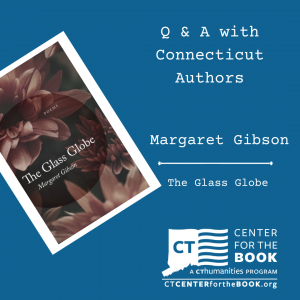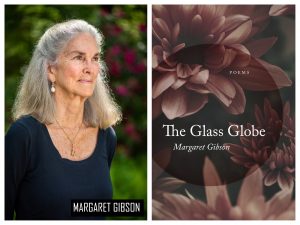Registration is open for the 2022 Connecticut Book Awards!
When: October 23, 2022 | 3:00-5:00 p.m.
Where: Hartford Public Library
Please note that clicking the button will bring you to another site for registration.
Q&A
COVID is still with us, although easing off a little, thank goodness. Did you have a favorite comfort genre to turn to when things were looking bleak? Something that lifted you away and to a different place for a while?
Unsurprisingly, as a poet myself I turn to poetry on a daily basis under any circumstances. It’s not unusual for me as a poet and a retired professor (Professor Emerita, UCONN) to spend time at home reading and writing poems, so that the period of seclusion during Covid may not have felt as odd or unusual to me as it may have to others. I was busy writing– and reading poets of all backgrounds and periods. As Poet Laureate of CT during that period I was also very busy putting together an anthology, WAKING UP TO THE EARTH: CONNECTICUT POETS IN A TIME OF GLOBAL CLIMATE CRISIS and writing an introduction for it. Many of the poets whose words brought me sustenance and delight were, therefore, Connecticut poets. Arranging zoom poetry readings during the Covid years was also a way to be with others and to hear their poems. Wonderful! Reading the poems of others takes me more deeply into myself as well as into the other poet, each poem an engagement with words and the deeper reality (whether social or personal or spiritual) to which words can transport us.
Where do you get your inspiration?
In writing poems and in my public work as a poet, I have recently focused on the natural world (which has always been a presence in my work), with a special emphasis on our current climate crisis. I live in the woods, so there are many sources of inspiration that come to me via my senses, and these become sources of imagery as well as questions or issues to contemplate. But I also write elegies, love poems, and poems that focus on social issues. Being alive to the moment, to my own thoughts and feelings, and to those of others– endless inspiration!
Who made reading important to you?
I suppose the earliest influence in my life was my mother, who taught reading, and who loved to read aloud to my younger sister and me. She made sure that the house had books, that we had library cards, and she relished words. An abiding memory is that of my mother, who had a lovely singing voice, singing to me from the cracked open door, the light from the hallway coming into my darkened bedroom. The combination of her singing voice and the words carried on that voice delighted and soothed me. Poetry and song are very close, as was my mother to me in those precious moments.
Where is your favorite place to read?
As a child I read books in trees, actually propped up in a dogwood tree, hidden by the leaves. I have recently written a poem called “Once,” whose first line is “Once there were women who read books in trees.” Now that I’m older, it’s a little harder to find a branch low enough that will support me or allow me to climb onto it—but my favorite place to read is still outdoors. A close second is on the sofa in the library room at home, winter and a fire in the fireplace. But really, I’ll read anywhere.
What book do you return to most often, whether passages or whole?
Right now I’m reading David Abram’s book BECOMING ANIMAL, and poems by Ada Limon, Tim Seibles, Jane Hirshfield, Chase Twichell. The poems I return to most often is the work of Ranier Maria Rilke: his “Duino Elegies” and the “Sonnets to Orpheus,” both in Robert Hass’s translation. I love his lyric introspection and his generosity. Other poets who abide in my heart, and to whose poems I return, are Gerard Manley Hopkins, Robinson Jeffers, Naomi Shihab Nye, Nathasha Trethewey, Jack Gilbert, Eamon Grennan. More recently, the work of British poet Alice Oswald.
Who is the most supportive person in your life when it comes to your writing?
John Long, my partner and a writer of plays and poems, reads all my new work and makes wonderfully helpful comments. A deep bow to him and also to my editors at LSU Press, particularly Neal Novak, whose work on both BROKEN CUP and THE GLASS GLOBE was invaluable.
Bio
Margaret Gibson, the poet laureate of Connecticut from 2019 to 2022, is the author of thirteen books of poems, including The Vigil, a finalist for the National Book Award. She has received grants from the Connecticut Commission on the Arts, the National Endowment for the Arts, and the Academy of American Poets. Her awards include the Lamont Selection, the Melville Kane Award, and the Connecticut Book Award. She is the editor of Waking Up to the Earth: Connecticut Poets in a Time of Global Climate Crisis.
Synopsis
With The Glass Globe, celebrated poet Margaret Gibson completes a trilogy distinguished by its meditative focus on the author’s experience of her late husband’s Alzheimer’s disease. In this new collection, she blends elegies of personal bereavement with elegies for the earth during the ongoing global crisis wrought by climate change. Gibson’s poems personalize the vastness of climate catastrophe while simultaneously enlarging personal grief beyond the limits of self-absorption. A work of great compassion and vision, The Glass Globe is a necessary, heartbreaking book from one of our most compelling poets.









